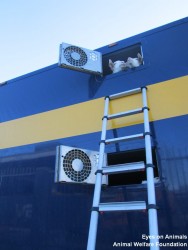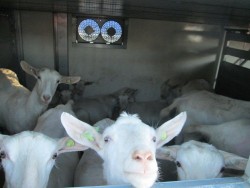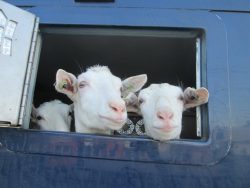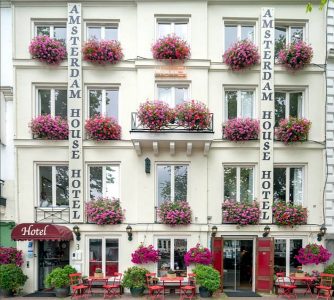Eyes on Animals did its best to raise the alarm about 250 Dutch, mostly pregnant, goats which were stuck on board two livestock trucks at the EU border between Bulgaria and Turkey. Due to unclear paper work issues and certain animals not fulfilling Turkish import requirements regarding maximum age, Van Dommelen transports were withheld by the Turkish authorities. Finally, after 2.5 days the livestock trucks were granted entry into Turkey but not without all of the goats having been put through a grueling journey of 130 hours: from Ijselstein in the Netherlands, to a town south of Ankara in Turkey. “Just another example of the horrors of long-distance transport of farm animals.”
 Eyes on Animals director, Lesley Moffat: “Eyes on Animals has warned the Dutch Ministry of Economic Affairs and the livestock traders, as well as the NVWA, on numerous occasions that long-distance export of fragile live animals, such as pregnant goats, is simply irresponsible. The EU/Turkey is especially notorious for causing animal suffering due to its long waiting times, the ever changing entry requirements, extreme weather conditions and lack of water and feed and basic infrastructure for animals. Many animals have already died in the stationary transport vehicles at that very border. The present Dutch policy, which aims to invest into the export of live animals to distant countries, is ethically unacceptable.”
Eyes on Animals director, Lesley Moffat: “Eyes on Animals has warned the Dutch Ministry of Economic Affairs and the livestock traders, as well as the NVWA, on numerous occasions that long-distance export of fragile live animals, such as pregnant goats, is simply irresponsible. The EU/Turkey is especially notorious for causing animal suffering due to its long waiting times, the ever changing entry requirements, extreme weather conditions and lack of water and feed and basic infrastructure for animals. Many animals have already died in the stationary transport vehicles at that very border. The present Dutch policy, which aims to invest into the export of live animals to distant countries, is ethically unacceptable.”
‘NVWA has to start an investigation’
Together with the organization Animal Welfare foundation, Eyes on Animals has been monitoring and inspecting long-distance transports of live animals from countries of the EU to Turkey and other distant countries since 2011. Eyes on animals had received a tip that a transport in question had indeed passed the Bulgarian border exit-point on February 2nd but had become stuck in “no-man’s land” between the Bulgarian and Turkish check-points due to some non-matching paper work. A Turkish member of Eyes on Animals subsequently travelled directly to the Turkish border on February 3rd to check on the situation on the ground, while the Dutch EoA-team contacted the NVWA and the Ministry of Economic Affairs to try and pressure the parties to quickly, together with Turkey, come up with a solution for the goats. Furthermore, Eyes on Animals has requested for NVWA to conduct an investigation into the trade and transport practices of the organizer of this export, Van Kooten (Montfoort) and of the transport company, Van Dommelen.
Moffat: “Recurrences must be prevented. Paperwork must to be 100% complete and the import requirements need to be fully followed. Finally, it is the animals that pay the price if authorities spot inconsistencies.”
 The transport carrier skipped the goats’ second rest-stop
The transport carrier skipped the goats’ second rest-stop
Eyes on Animals has secured copies of the travel documentation: the goat transport in question was travelling from Ijselstein (NL) to Gölbasi, Turkey (nearby Ankara): almost 4000 km. According to the approved travel plan the transport carrier (Van Dommelen) was to make two rest-stops where the goats were to be unloaded, fed and given plenty of water. Those were located in Hungary and southern Bulgaria. However, the transport carrier skipped the 2nd rest-stop and instead continued on to the final destination. Moffat: “So the transport carrier maybe did not cross the legal transport duration limit of 29hours since the first rest-stop in Hungary, but the border crossing with Turkey is notorious for its extreme waiting times, and the truck was still to travel at least 10 hours once admitted into Turkey. Once in Turkey there are no more control posts. Drivers choose to put the welfare of the transported animals at risk by taking advantage of this fact and the lax law enforcement once on Turkish side. Furthermore, the omitted rest-stop should have never been mentioned on the travel-documents delivered to NVWA-export-certification to be evaluated, if it was not going to be respected! We even have an email from 28.01.2015 wherein the employees of the Bulgarian rest-stop confirm Van Dommelen’s reservation.” ”
On Wednesday February 4th the Turkish EoA employee has once more gone to check on the condition of the goats which have by then been in transit since January 30th. Moffat: “thankfully, the goats were not too crowded and the drivers had extra feed for the animals, but the longer the goats were stuck the higher the risks to their welfare. For instance, the levels of ammonium in the air increases as the dirty bedding cannot be cleaned out; the goats transported are in the last phases of pregnancy which increases the chance of labor and thus the risks of being trampled for the newborn lambs. EoA has quite frequently been involved in rescues of newborn animals at border check-points.” In the early evening of Wednesday we finally received word that, following contact with the Netherlands, the Turkish authorities have given the stranded trucks the green light to continue on their journey into Turkey. This would mean 10 more hours before the goats would be unloaded at the final destination.
History keeps on repeating itself, concludes Lesley Moffat. “Far too many animals become victims here. EoA has on numerous occasions, encountered trucks full of animals – cattle and sheep – which go into labor, die or are close to dying while waiting on the Turkish border due to incompetency in complying with import requirements and/or lack of basic provisions. A similar situation took place in October of last year when a transport carrying pregnant buffalos from Italy was stuck for days at the EU-Turkish border (see film). We have repeatedly rung the alarm about that matter with the Dutch authorities and the European Commission.” As a result of that last incident EoA has directly addressed the parliamentary committee for economic affairs “How often are animals going to become the victim of our economic ambitions?”
Please click HERE to watch the video.


